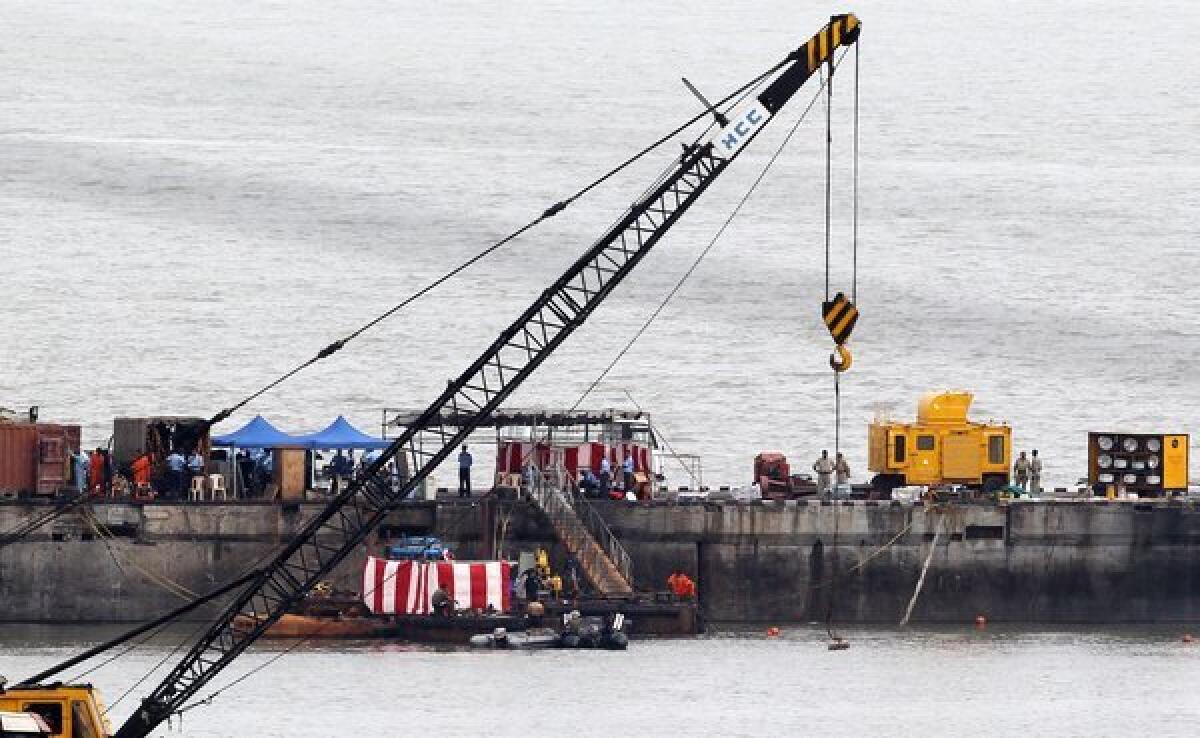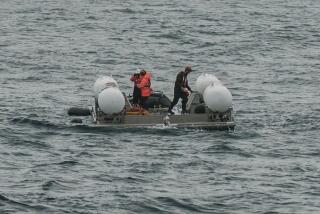4 bodies found in sunken India submarine as search goes on

NEW DELHI -- Four bodies were recovered Friday from a submarine that exploded and burned in Mumbai two days earlier, the Indian navy said, and navy divers working around the clock have heard no sound or other indication of life inside, making it unlikely any survivors will be found.
When the disaster struck, 40 of the 58 crew members were on shore or able to jump off the vessel. Images on social media of the explosion, which occurred just after midnight Wednesday, showed a huge fireball and raging yellow and white fire. The charred state of the corpses made early identification difficult.
“It’s a real nightmare,” said C. Uday Bhaskar, a visiting fellow with New Delhi’s National Maritime Foundation and a retired navy commodore. “It must’ve been a very sudden end with a fire, explosion and water rushing in.
An investigation has been ordered into the cause of the incident aboard the 16-year-old electric- and diesel-powered Sindhurakshak, or “sea defender,” which lies partially submerged in about 25 feet of water beside the pier where it was docked. Rescue and recovery operations have been complicated by the intensity of the fire, which fused shut all hatches. Sabotage has not been ruled out but is unlikely, officials said.
“Access to the inner compartments of the submarine was made almost impossible due to jammed doors and hatches, distorted ladders, oily and muddy waters inside the submerged submarine resulting in total darkness and nil-visibility even with high power underwater lamps,” navy spokesman Narendra Vispute told reporters on Friday.
Divers managed to reach the second compartment behind the conning tower after 36 hours of continuous diving, Vispute said, adding that the four bodies would be sent to a naval hospital for DNA analysis. The high temperatures involved may have incinerated some of the bodies, the navy added, although every effort would be made to recover them if they exist.
The damaged state of the submarine’s control room makes it very unlikely that bodies will be recovered in any of the submarine’s forward compartments, the navy said in a statement Friday. “The explosion and very high temperatures, which melted steel within, would have incinerated the bodies too,” it added.
Niraj Kumar, head of TMC Services, a placement service for commercial divers, including former navy divers, said those trying to gain entry to the wreck are probably working an hour or two before handing off to replacements. “It’s hard work,” he said. “Right now is the monsoon, so visibility is bad, which makes working more difficult.”
The Sindhurakshak is one of India’s 10 Kilo-class submarines, equipped with Club-S cruise missile systems, purchased from Russia between 1986 and 2000. The ship returned from Russia late last year after an $80-million overhaul.
Some questioned the slow recovery process. “We’ve learned a bit about the navy capability, given that it’s taken so long to get into the vessel,” said Saurabh Joshi, editor of StratPost.com, a defense industry website, especially given that the disaster happened at the dock and not far out at sea. “It tells you something about how equipped the navy is to deal with surprises,” he added.
But Bhaskar said divers must contend with a sludge-filled seabed, live ammunition and a 238-foot long, 2,000-ton ship pointed nose down at an awkward angle, all of which complicates efforts to enter the hull or give it enough buoyancy so it floats. Furthermore, he said, India’s salvage capability is not great, as seen by its reliance on Singapore after past shipping disasters. “That’s a national gap given the maritime nation India wants to be,” he added.
Raja Menon, an analyst and a retired vice chief of navy staff, said it’s likely the bulkheads separating the submarine’s internal compartments were blown apart, flooding the ship and leaving no air for survivors, even if they could have withstood the heat. Furthermore, the ship’s flooded state suggests the hull was breached by a torpedo or cruise missile that exploded. “Once it broke through, the fire had access to more oxygen,” he said.
The accident will almost certainly prompt the navy to conduct a serious review of its crisis management system, analysts said. “There definitely will be soul searching, they have a big black eye right now,” Joshi said. “It’s not the sort of thing they ever want to have happen again.”
ALSO:
New Iran president wins approval for most Cabinet choices
At 123, Bolivian man may be the oldest human who ever lived
Death toll from car bombing in Hezbollah’s Beirut stronghold at least 14mark.magnier@latimes.com
More to Read
Sign up for Essential California
The most important California stories and recommendations in your inbox every morning.
You may occasionally receive promotional content from the Los Angeles Times.










